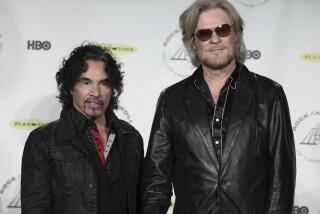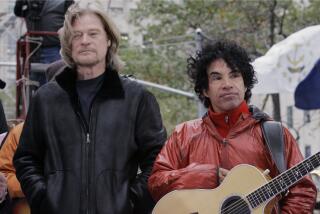Search for Peace Leads to Court Brawl : Estate: Ownership of the books and collected artifacts of philosopher are the subject of a bare-knuckles legal battle.
- Share via
Philosophically speaking, Manly P. Hall would be appalled at the hubbub he is causing.
For six decades, the rotund, pipe-smoking scholar roamed the Earth, quietly gathering the secrets of peace and harmony from humanity’s most venerable religious figures.
He amassed an eclectic collection of more than 50,000 books and historical artifacts during his journeys. He built a museum and library in Los Angeles to display his treasures and formed a nonprofit organization--the Philosophical Research Society--to encourage others to study the materials.
When Hall died three years ago at the age of 89, he had delivered more than 8,000 lectures delving into the mysteries of inner solitude--most from a thronelike chair at the front of his own auditorium.
Since then, though, there has been precious little peace or solitude surrounding the legacy of Manly Hall.
Hall’s 88-year-old widow, Marie, and current leaders of the Philosophical Research Society are fighting over ownership of the unusual collection, which contains Babylonian tablets, 3,000-year-old Chinese oracle bones, a Japanese Buddhist sutra written in blood and other items.
Marie Bauer Hall contends that society officials seized control of her aging husband during his final months and duped him into signing over the collection--worth as much as $10 million--to them.
Officials of the society vehemently disagree, contending that they only followed the wishes of a thoughtful man whose goal in life was to perpetuate scholarship in an increasingly troubled world.
On Monday, a Los Angeles Superior Court judge will be asked to resolve the dispute. And Judge Harvey A. Schneider may need the philosophical wisdom of one of Manly Hall’s sages--Solomon--to do it.
The one thing everybody agrees on is that the thoughtful, gentlemanly Hall would be surprised and dismayed by the fight he has triggered.
“He’d be very sad about this,” said Nora Sloboda, a Los Feliz resident who works as a volunteer in the library that Hall established.
“He’d think it was ridiculous,” said Guy Douglass, a movie propman from Hollywood who attended Hall’s lectures for 37 years.
“He’d be mad as hell,” acknowledged Joe Kirwan, a lawyer for Marie Hall who will try to prove that Philosophical Research Society directors used “fraud and deceit” to trick Manly Hall into signing over the property six days before his death.
The non-jury trial is expected to take 20 days, with Schneider issuing his ruling about two months after that. It follows 30 months of legal wrangling that have kept a series of lawyers busy cranking out a blizzard of more than 325 court motions, declarations and depositions.
The pretrial proceedings suggest that both sides have adopted a bare-knuckles philosophy.
“It’s a very contentious litigation,” said retired Appeal Court Judge Richard Amerian, who has screened evidence in the case for Schneider.
Pretrial depositions and memoranda have a bitter tone. One includes a psychiatrist’s report that one of the defendants has developed a “murderous rage” toward one of the plaintiff’s lawyers. Another refers to a doctor’s suggestion that there was “fishy business” to the death of Hall at his Hillhurst Avenue home on Aug. 29, 1990.
That death--which was not made public for 72 hours--was followed by a lengthy coroner’s investigation concluding that Hall died of heart disease. Los Angeles police say the case is still open, however.
“There are some complicated issues surrounding his death,” said homicide Lt. Dave Waterman.
It’s not all that complicated to Marie Hall. In a lawsuit, she alleges that Daniel Fritz, a banker who had worked in computer marketing and was an ordained minister, befriended her husband in 1987 and represented himself as an “Oriental priest” who could help Hall “improve his health.”
According to Marie Hall, Fritz soon began taking “personal care” of her husband, persuading him to discontinue his regular medical care. She contends that by 1990, Fritz and Mogens Brandt, an accountant, had taken over her husband’s property--including management of the Philosophical Research Society.
She alleges that Fritz “forged the signatures” of her and her husband and withdrew $100,000 from a bank account. Later, Fritz and Brandt got her husband to hand over a stamp collection worth $1 million, as well as “priceless” artwork and other property, she contends.
Finally, Marie Hall asserts, Brandt, Fritz and others tricked her ailing husband of 40 years into signing a new will.
Marie Hall contends that Manly Hall was senile on Aug. 23, 1990, when he signed papers leaving his estate to a trust controlled by Fritz and Brandt. He died six days later.
Fritz and Brandt deny wrongdoing.
In court documents, they assert that Manly Hall was mentally alert to the end: “Mr. Hall was giving lectures on subjects concerning analytical philosophy and social mores within a week of his death.”
In an interview, Fritz said he met Hall in the early 1980s and became an admirer of the scholar’s work. “He was the best-kept secret of this century,” Fritz said.
Fritz said he stepped in to help Hall after he fell ill in 1987. “I did my best to help him sustain life as long as he could,” Fritz said. He added that Hall “saw more medical doctors” with his help than he had before the pair’s association.
The defendants contend that Hall acquired books and artwork specifically for the society, collecting many items as early as 1928, long before Manly and Marie Hall married. After their wedding in 1950, the Halls jointly donated other artifacts to the society and wrote them off on tax returns as charitable contributions, they claim.
They suggest that Marie Hall’s lawyers are pressing the case for a “phantom plaintiff” in order to collect legal fees.
At her Los Feliz-area home, Marie Hall scoffs at that idea. She said she plans to testify against those she characterizes as crooks.
She said her goal is to maintain her husband’s collection in Los Angeles, “not selling anything,” and eventually joining forces with a Dutch museum that also has a large library of philosophical materials.
A few blocks away at the society’s pale pink Los Feliz Boulevard headquarters, lawyer Christopher Kelly spoke for employees, issuing a string of “no comments” on their behalf to a reporter’s questions.
Fritz produced a 1990 brochure containing an essay written by Manly Hall that outlined a “planned reorganization that prepares the society for its work in the next century.”
In it, Hall explained that “when I was taken ill in 1987, I decided to create a three-person management group to work with me on the immediate needs of the society” and undertake the “complete rehabilitation” of its $500,000-a-year business procedures. The brochure did not say who the three were, and Richard Odom, the society’s lawyer, refused to comment on the case.
By all accounts, that was a major change in operational philosophy by Hall--who had casually run the no-membership-required society by himself since founding it in 1934.
Hall’s energies were spent on writing and lecturing. Over the years, his speeches on such topics as Chinese metaphysics and Zen Buddhism were frequently reported in detail by The Times.
Hundreds would attend his lectures about comparative religion, ethics and morality, and medieval philosophy. They would listen intently as Hall spoke for an hour and a half at a time, never pausing to look at notes or to take a sip of water.
A Canadian who was self-educated, Hall never endorsed any one line of religious thought. Followers say he believed in reincarnation and in a mixture of the Golden Rule and living in moderation. “He taught that practically all religions and philosophies say that in different words,” said Irene Bird, a retired Los Alamitos realty agent who attended Hall’s lectures for 30 years, often conducting workshops afterward.
Those familiar with Hall’s vast collection said they hope it remains intact.
“Even though as a seller you like to see stuff come on the market, when you see a collection that reflects the ethos of an individual, it should be maintained,” said Michael R. Goth, proprietor of the Phoenix Bookstore in Santa Monica.
“He put his whole life into putting this collection together. It’s very sacred,” said Sloboda, the society’s volunteer librarian.
Longtime follower Guy Douglass said: “It’s a shame his life ended this way.”
More to Read
Sign up for Essential California
The most important California stories and recommendations in your inbox every morning.
You may occasionally receive promotional content from the Los Angeles Times.














